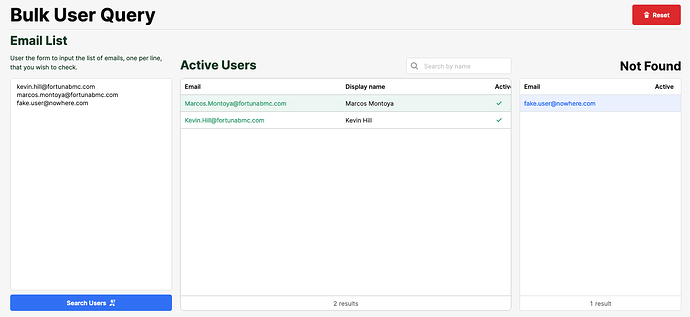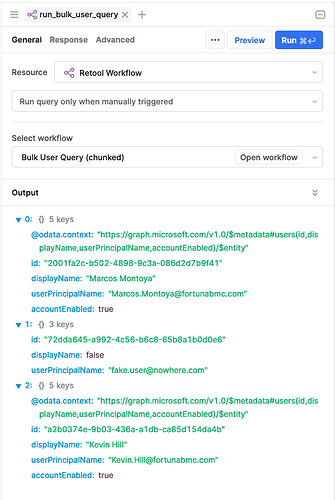I wanted a way to quickly dump in a list of email, and see if they are active or deleted from our 0365 tenant.
I made a very simple interface for the emails:
This triggers the first workflow, that will chunk the request into batches:
Which calls the second Workflow to do the requests:
And returns my users from O365:
PS: If you are wondering why my response blocks are styled with green / red, check out my other post 
2 Likes
@khill-fbmc Thanks for sharing!!! Very cool, and those custom colors. . . . 
This concept can be handy in Audit Analytics to do something we called as "Fuzzy Logic". For example, we can check whether you can find an address in the Employee file is found in a shipped to address of an invoice.
Fuzzy Matching for Address Verification
- Handling Variations in Address Formats: Addresses can be recorded in various formats, with discrepancies in abbreviations, street names, or numerical representations. Fuzzy logic allows for matching addresses despite these variations, identifying similarities based on a degree of match rather than exact matches.
- Identifying Potential Fraud or Conflicts of Interest: By applying fuzzy logic to compare addresses in employee files with those in shipping details of invoices, auditors can identify instances where goods or services might be improperly directed. This is particularly useful in large organizations where manual verification would be impractical.
- Improving Data Quality: Fuzzy logic can help in cleaning and standardizing address data by identifying duplicates or near-duplicates, thus improving the overall quality of the data used in audits.
- Reducing False Positives/Negatives: Traditional exact match algorithms can result in high false positive or negative rates when dealing with unstructured data like addresses. Fuzzy logic reduces these errors by accommodating the nuances of human data entry, thereby enhancing the accuracy of audit analytics.
- Efficiency and Scalability: Automated fuzzy matching processes can handle large volumes of data quickly and efficiently, making it possible to conduct comprehensive audits in shorter timeframes. This scalability is crucial for organizations with extensive transaction records.
The whole process can be handled much easier if we create a workflow to access the OpenAI's Code Interpreter through their Assistants API. I demonstrated this yesterday to a CPA firm in SF and this was the response by the owner.
"I would be open to talking about other options or using something like Retool. I don't have a lot of time right now, but maybe we can chat after tax season when I have more time. I really want to create a solid Audit Analytics app powered by AI"
1 Like
![]()



